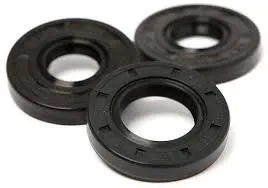10 月 . 21, 2024 15:39 Back to list
Understanding Hydraulic Cylinder Oil Seals for Enhanced Performance and Durability
Understanding Hydraulic Cylinder Oil Seals Importance and Functionality
Hydraulic cylinders serve as vital components in various industrial, automotive, and construction applications. These devices convert hydraulic energy into mechanical energy, enabling machines to perform heavy lifting and precise movements. A crucial part of the hydraulic cylinder’s functionality is the oil seal, which plays a significant role in maintaining the efficiency and longevity of the system.
What is a Hydraulic Cylinder Oil Seal?
A hydraulic cylinder oil seal is a component designed to prevent the leakage of hydraulic fluid from the cylinder. It forms a critical barrier that ensures the fluid remains contained within the cylinder while allowing internal components to move freely. Generally made from elastomers or polymers, these seals are engineered to withstand high pressure, extreme temperatures, and exposure to various chemicals commonly found in hydraulic fluids.
Types of Hydraulic Cylinder Oil Seals
There are several types of oil seals used in hydraulic cylinders, each tailored to meet specific sealing requirements
1. U-Cup Seals These seals have a U-shape, allowing them to exert pressure on the cylinder walls, creating a tight seal. U-cup seals are popular in various hydraulic applications due to their ease of installation and effective sealing capabilities.
2. O-Rings O-rings are circular elastomer seals that can be used either as a static or dynamic seal. In hydraulic systems, they are often incorporated in conjunction with other seal types to enhance sealing performance.
3. Rod Seals These seals are used on the rod of the cylinder, preventing fluid from leaking out while allowing the rod to extend and retract smoothly. Rod seals are designed to handle wear and pressure fluctuations common in hydraulic systems.
4. Piston Seals Located at the piston, these seals help to maintain pressure within the cylinder. They are critical for the efficient operation of the hydraulic system and are designed to handle high-pressure conditions.
5. Wipers or Excluders These seals are designed to prevent dirt and contaminants from entering the hydraulic cylinder. By keeping external elements out, wipers help prolong the life of the internal seals and the hydraulic fluid.
hydraulic cylinder oil seal

Importance of Oil Seals in Hydraulic Systems
The oil seal is crucial for maintaining the integrity of hydraulic systems. Here are some of the reasons why they are essential
- Leak Prevention Effective sealing is vital to prevent fluid loss, which can lead to inefficient operation and increased maintenance costs. Leakage can also create safety hazards in industrial and automotive applications.
- Pressure Maintenance Oil seals help maintain the necessary pressure required for the hydraulic system to operate efficiently. A loss of pressure due to faulty seals can result in decreased performance and responsiveness of the machinery.
- Protection Against Contamination By using seals such as wipers, hydraulic systems can limit the ingress of contaminants like dust, dirt, and water. This is critical in ensuring the longevity of hydraulic components and the fluid itself.
- Energy Efficiency Well-functioning oil seals contribute to the overall energy efficiency of hydraulic systems. Minimizing hydraulic fluid leakage and maintaining pressure means less energy is required for operation.
Maintenance and Replacement of Oil Seals
Regular maintenance of hydraulic systems includes inspecting and replacing oil seals when signs of wear and degradation are observed. Factors such as temperature fluctuations, high pressures, and exposure to chemicals can significantly affect seal performance. Signs that an oil seal may need replacement include visible leakage, reduced efficiency, and abnormal sounds during operation.
To ensure optimal performance, operators should adhere to the manufacturer's guidelines regarding seal specifications and replacement intervals. Investing in high-quality seals not only enhances the reliability of hydraulic systems but also reduces the frequency of maintenance required.
Conclusion
In summary, hydraulic cylinder oil seals are indispensable components that significantly impact the efficiency, performance, and durability of hydraulic systems. Understanding their importance, types, and maintenance can help operators ensure their hydraulic machinery operates seamlessly, ultimately leading to cost savings and enhanced productivity. Whether in industrial applications or automotive systems, the role of oil seals cannot be underestimated in achieving optimal hydraulic function.